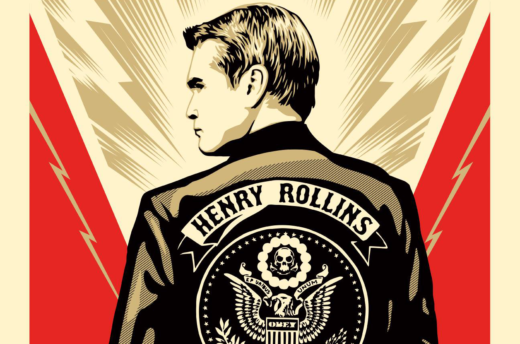A few days after Barack Obama was re-elected in 2012, I talked with Henry Rollins for a politically-charged interview. While the country was still in the midst of birther arguments and Republican protests, the author/spoken-word performer/hardcore frontman/actor spoke articulately and passionately about the ugliness of that election cycle (which, with hindsight, is a little ironic) and the future of America in a post-Obama landscape. It's an interview I've thought about a great deal during the last 18 months, because of the incredible optimism Rollins expressed at the time about the changing cultural landscape of the United States.
Here's a sample of what he said in 2012:
Here’s something you might not have considered… Next time you see some young people on the street -- you know, those 14-year-old, super-loud-at-bus-stops, kids -- realize that in 2016, they’re going to be voting. That’s trippy.
I mean these kids are in ninth and tenth grade right now. If you think you’re going to be able to sell to a 14-year-old girl who is waking up to being a young adult and all that comes with that, and a 14-year-old-kid who’s going to be raised on music and video games… If you think you’re going to be able to sell him on hating women and hating gays when half his friends are gay and punk rock and loud… The 14-year-old kids are living in a world where they’ve never not had the internet. It’s a whole new world.
By 2016, the move on factor -- the distance we will have moved from now 'til then -- won’t only be technically more advanced, it will be culturally more advanced. If you think Americans are getting over homophobia now, you just wait 'til 2016. I’m just looking at the sheer numbers of young people… Now, more and more, as soon as they hit 18, they’re voting. So, I’m more than just optimistic... The world is changing rapidly and Obama really broke it open and now the change is super change-y.
In a way, what he was describing sounds a lot like the youth movement that swelled around Bernie Sanders -- even though he missed the (admittedly hard-to-predict) bigger picture. What's just as remarkable about that four-year-old interview is Rollins' then-perception of the American right wing. His words sound ominously familiar, ringing of the "post-truth" make-America-great-again contingent that emerged in this most extreme of election cycles:
They seem to be immune to information. They seem to be mostly emotional. They can’t all be racist, but I think there’s an aspect of that. But what I think it might just be is that America is changing. The world is changing. Some people just can’t deal with that. And you hear some people saying 'We want our country back!' Okay. From whom? No one’s trying to take anything. 'We want it back like the old days!' Okay. From when? Can you pinpoint a year? And they never do that. And so, I try and help them and say, 'Okay, you want 1861. You want pre-Civil War. And you want your no 13th Amendment, no 14th Amendment. You want your women in the kitchen, you want your black men out in the field. You want people to shut up and know their place. It’s the damnedest thing.
Four years and one week after that interview, which was both eerily prophetic and wildly incorrect in its predictions, I attended the second date of Rollins' latest spoken word tour at the Paramount Theater in Austin, Texas. On my way in, I was deeply curious about what Rollins would have to say about the 2016 election cycle; how his view of the country may have changed in the last four years; how he had essentially seen a youth movement that didn't accomplish what he'd assumed it would.
As soon as he hit the stage, Rollins got straight into it.


